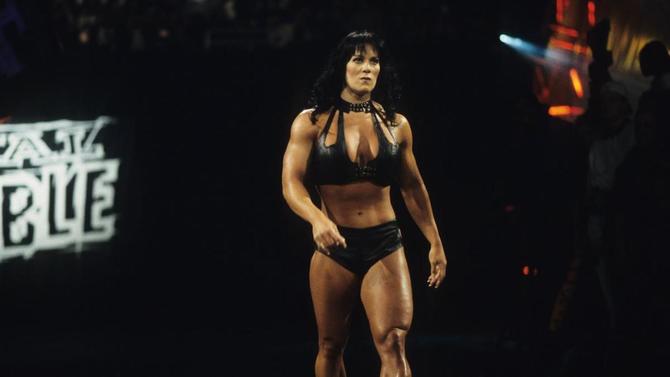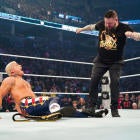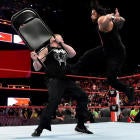When the news was broken in February that D-Generation X would be the headlining inductee of Saturday's WWE Hall of Fame ceremony during WrestleMania 35 weekend in New York, one had to look closely at the fine print for a story that may have been even bigger.
Historically, when inducting large factions or wrestling families to its Hall of Fame, WWE is specific in regarding which members receive the honor. For example, despite having upwards of 20 members throughout its 15-year history, WWE inducted the Four Horsemen in 2012 as simply the grouping of Ric Flair, Arn Anderson, Tully Blanchard, Barry Windham and manager J.J. Dillon.
When it came to DX, which at one time considered everyone from Rick Rude and Mike Tyson to Hornswoggle and Stephanie McMahon as members, WWE chose the core six to get the call for induction: Triple H, Shawn Michaels (who was inducted as a singles star in 2011), Sean "X-Pac" Waltman, the New Age Outlaws (Billy Gunn and "Road Dogg" Jesse James) and Chyna.
Big fan of WWE? Subscribe to our podcast -- State of Combat with Brian Campbell -- where we go in depth on everything you need to know in WWE each week. Ad be sure to listen to our full audio interview with Triple H in the embed below.
The most surprising name of that group was certainly Chyna, whose posthumous induction was always thought to be in question considering the negative headlines that were created during a troubled life after wrestling. Chyna, whose real name was Joanie Laurer, died of a drug overdose in 2016 at age 46 following years of substance abuse, arrests and an adult-film career that was heavily marketed upon the title of her wrestling character.
Sadly, Chyna's passing came before she could publicly receive the proper credit for her role as a groundbreaking female wrestler, especially considering her death came just weeks after WrestleMania 32 and a turning point for WWE's "women's revolution" when the company eschewed the title of "Divas" in favor of formally presenting female superstars in a light on par with their male wrestling counterparts.
Regardless, Chyna's induction as part of DX is better late than never to most fans who watched her re-establish what was possible for a female performer during the height of the "Attitude Era" due to her incredible strength. Along with becoming the first female to compete in the Royal Rumble and the only woman to hold the intercontinental championship, she made the idea of a woman wrestling against a man on even terms seem believable.
No one was more thrilled for her induction than DX stablemate Paul "Triple H" Levesque, the WWE COO who was linked romantically with Chyna in the late 1990s before eventually marrying Stephanie McMahon.
"It's awesome. I'm thrilled for her as the human being that I knew, for her family and for her sister, who I knew," Levesque told CBS Sports' "State of Combat" podcast last week. "There is probably not a woman who has ever made as big of an impact as she did. Somebody that transcended the business on her own and I'm sure will be in the Hall of Fame sometime on her own. I think it's fitting she is in there with DX in the beginning because it's how she started, and I think it's what it should be."
A competitive bodybuilder before becoming a wrestler, Chyna made her WWE debut in 1997 at the In Your House 13: Final Four pay-per-view. She would go on to a brief yet impactful run with the company that ended in 2001 and included two reigns as intercontinental champion and one as WWE women's champion (which she won by defeating Ivory at WrestleMania X-Seven shorty before leaving the company).
Although she made a handful of brief stops on the independent scene in the years that followed and starred on reality shows like "The Surreal Life" and "Celebrity Rehab," the majority of Chyna's post-WWE life did nothing but alienate her relationship with the company.

"After she left the business and everything else prevented [her Hall of Fame induction] for a period of time, it's funny because people look at it and go, 'Finally, they are putting her in,'" Levesque said. "But she's going into a class with Honky Tonk Man. Like, he's just getting in there and is a generation before. It's not a time-limit type thing.
"I'm thrilled that it's this year, partly because finally the time has passed where everything can just happen and it can be right for her where the moment of putting her in the Hall of Fame for this manner is about her accomplishments and not about anything else. That was always my bigger point of this. You can't do it when [the negative] becomes the conversation. The conversation needs to be about her accomplishments and what she did here."
Considering Chyna's groundbreaking legacy, he could only smile when considering what her reaction would be to entering the Hall of Fame during the same year that women will main event WrestleMania for the first time when Ronda Rousey, Becky Lynch and Charlotte Flair compete in a historic triple threat match on Sunday at MetLife Stadium in New Jersey.
"If you could go back and say it to her, it's something that in that point of time you would be like, 'No way, that would have been inconceivable,'" Levesque said. "She probably inspired a lot of the women that are doing what they are doing right now, and it couldn't have been any more of the right time and the right spot, and it all happened for a reason that way."
When it comes to the overall legacy in which DX cemented within WWE as a faction, Levesque believes they played just as big of a role alongside The Rock and "Stone Cold" Steve Austin in helping transition the promotion toward becoming relevant to a new generation of fans.
"D-Generation X was something that transcended sports entertainment," Levesque said. "To this day, there are certain things in the business that become massive. On March 16, Austin 3:16 trends. SmackDown has become part of the lexicon of pop culture because of The Rock. When we were in our heyday of doing it, there wasn't a week that went by where I didn't see SportsCenter with someone scoring a touchdown and crotch-chopping or somebody hitting a home run and turning around and crotch-chopping the other team or saying, 'I've got two words for you.'
"It took on a life of its own and transcended the business, and turned the WWE from being what it was and the generation prior and all of a sudden this explosion of a whole new generation of fans. D-Generation X was a big cog in that wheel, and that's the legacy of that group."
















